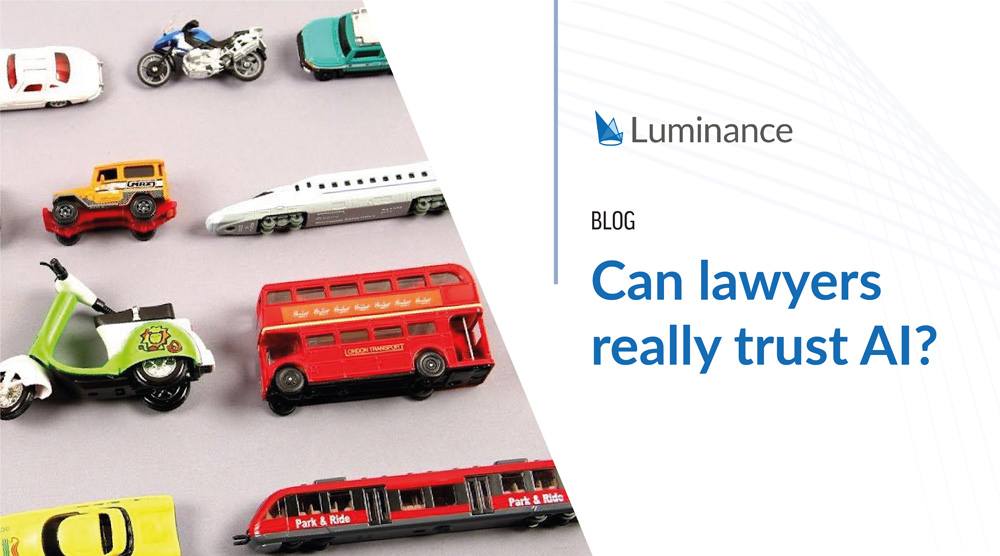
Blog
Can lawyers really trust AI?
6 January 2020 | Luminance
The ‘AI Winter’ appears to be well and truly over.
Only last week it was announced that AI can be used to assist radiologists in diagnosing breast cancer from mammograms. This innovation promises not just to allow valuable NHS resources to reach more people, but potentially to significantly improve outcomes for patients. As well as making waves in the medical world, technology investment in the legal profession hit $1.2 billion in 2019. At the same time, misunderstandings about the role of AI in driving change still linger. The age-old fear that the ‘robots will replace us’ is pervasive. Yet just as radiologists will be augmented in their ability to identify cancer rather than replaced by a machine, with true AI, lawyers will never need to cede control to a ‘black box’ and risk their professional reputations.
So, what is true AI?
Firstly, it is important to understand why question marks have been looming over legal AI.
Early iterations of legal AI did in fact require lawyers to compromise the legal process. At first, keyword search was used to significantly cut down review time. While keyword search allows lawyers to find specific wording very quickly, it is not flexible enough to identify provisions or wording that differed from the standard or should not be there in the first place. Rules-based systems followed, which rapidly regurgitate predetermined concepts following an intensive programme of training and configuration. These had the advantage of widening the search results beyond specific key words.
However, because these systems had no real understanding of the meaning of the language in the dataset, they were limited to answering pre-set questions and queries. Still the ‘unknown unknowns’ could easily remain undiscovered and due diligence reports were in danger of becoming endless lists of clauses rather than substantive findings that impact on the deal. Too much ‘trust’ was going into a machine, taking the lawyer out of the review process and requiring them to rely on a ‘black box’ to tell them what mattered. As a result, issues surrounding the transparency, ethics, regulation and accuracy of legal AI became important talking points.
Luminance brings true AI to the legal profession. Starting with pattern recognition which allows no preconceptions to colour the findings, and leveraging powerful machine learning algorithms to accelerate reviews exponentially over time, the platform enhances document review by learning from and adapting to the legal data it sees. It is still the job of the lawyer to turn this into actionable insights. Luminance acts as a seamless and transparent extension of the lawyer’s review, exposing critical insights with no reference to pre-conceived human notions and ensuring that it is the lawyer who is controlling and steering the review process- not the machine.
The new dawn of Legal AI
This is all made possible by Luminance’s core technology, LITE (Legal Inference Transformation Engine), which uses supervised and unsupervised machine learning to instantly read and understand huge volumes of detailed and complex legal data. LITE’s advanced algorithms identify the underlying patterns in language at both document and clause level to uncover the areas of importance and hidden risks in any given dataset.
Crucially, it is the lawyer at the heart of the review process that makes Luminance so powerful. As the advisor interacts with the documents, LITE learns from these interactions to develop new insights much like the human brain, making the tool incrementally more powerful and tailored to your practice. This is not dissimilar to a child learning what a bus is, for example. As the child is exposed to similar and dissimilar vehicles, they can build their own rules to refine their understanding to distinguish a bus from a car or a motorbike.
AI is not a ‘magic wand’
At the same time, there is a need to reconceptualise the purpose legal AI serves. For some, the idea of handing over their legal duties and responsibilities to a machine is appealing and terrifying in equal measure. But this black box approach to legal technology is not beneficial for the lawyer or their organisation.
Relying solely on a machine’s output, pre-codified by human input, makes way for a very narrow review. Luminance’s uniquely flexible machine learning gives lawyers the answers to questions they may not think to ask or have time to consider, supercharging them to deliver the best possible advice. This is particularly pertinent in an ever-changing and complex legal market, where a flexible solution is needed to adapt to whatever comes lawyers’ way.
Lawyer + Machine
Legal AI needs to be reclaimed as a pioneering tool which revolutionises legal processes. Underpinning this, is that true machine learning should not force lawyers to relinquish control to a machine. As such, questions about ‘trusting’ a machine are misplaced. Using Luminance, it is the advisor that is driving the process and making the all-important decisions.